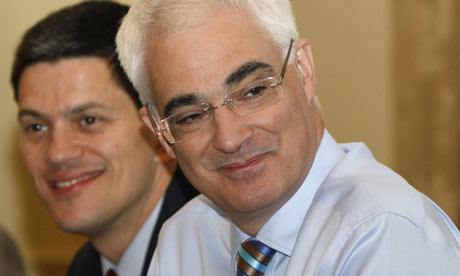UK unemployment reaches 2.1m on Darling's budget day
Unemployment figure makes biggest jump in almost two decades to reach 6.7%
UK benefit claimants where you live
UK unemployment - the jobless map of Britain
- guardian.co.uk, Wednesday 22 April 2009 09.54 BST
- Article history

Chancellor Alistair Darling attends a cabinet meeting before the annual budget 2009 announcement. Photograph: Stephen Hird/Reuters
Unemployment in Britain recorded its biggest jump in almost two decades last month, official figures revealed this morning, just hours before the chancellor, Alistair Darling, delivers his budget speech in the Commons.
Unemployment on the International Labour Organisation (ILO) measure leapt by 177,000 in the three months to February from the previous quarter, its biggest increase since 1991. This took the jobless total to 2.1 million - the highest level since Labour came to power in 1997, according to the Office for National Statistics.
In last month's figures, unemployment passed the 2 million mark for the first time in 12 years. Experts are warning that it will easily break the 3 million barrier by the end of the year, pushing the jobless rate, now at 6.7%, into double digits.
The ILO measure takes into account people not eligible for benefits, such as 16- and 17-year-olds and unemployed City workers. The jobseekers' allowance is means tested and many of the sacked City workers were on high salaries.
The narrower claimant count measure, which covers the number of people out of work and claiming jobless benefits, rose by 73,700 in March from February to 1.46 million. This took the jobless rate to 4.5%, the highest since February 1998. The increase was less than the City had expected and compares with a 136,600 jump in February.
Vacancies across the economy fell by 68,000 to 462,000 in the three months to March.
The figures show that pay growth has virtually ground to a halt. Average earnings including bonuses edged up 0.1% over the three months to February from a year ago - the lowest growth rate since 1991. This was due to bonus payments being all but wiped out; excluding bonuses, pay advanced by 3.2%, the smallest increase in eight years.
Alan Tomlinson, of insolvency practitioners Tomlinsons, said: "The impact of the recession on smaller businesses is especially severe. Company failures in this vital sector are still increasing and are likely to do so for some time yet, putting more and more people out of work.
"The Federation of Small Businesses estimates that around 120 small businesses are going bust each day, but this figure is already looking like wishful thinking. What is certain is that the businesses that are disappearing and the jobs they generate will take years to replace. Sadly, these appalling unemployment figures will get much, much worse before they get better – there's still a lot of pain in the pipeline."
The TUC warned that mass unemployment was the "biggest possible drain" on the government finances and reiterated that jobs should be at the heart of today's budget. Unions and employers have urged the government to introduce subsidies for shorter working hours.
There would be even more people out of work if many firms, in particular carmakers, had not opted to cut working hours to avoid widespread redundancies. At least a quarter of manufacturers have moved to short-time working to safeguard jobs.
The TUC general secretary, Brendan Barber, warned that if the number of people claiming jobseeker's allowance increased by a million over the next year, it would cost taxpayers more than £250 a second.
"Every person on the dole costs the rest of us £8,100 a year, and that's before you consider the wider price to be paid: of rising crime, declining public health and of leaving communities to fend for themselves," Barber said. "I want to see the government show the same determination in protecting working people from the worst of the recession as it has in protecting banks from the greedy excesses of their bosses."
The TUC has called on the government to implement a £2bn work scheme for the long-term unemployed in today's budget, in an effort to create at least 100,000 temporary jobs in deprived areas of the country.

No comments:
Post a Comment